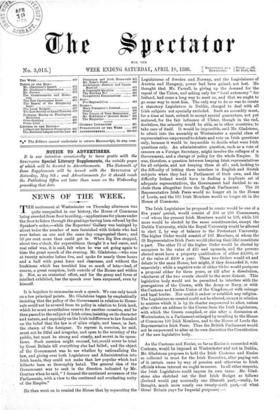The Irish Legislature he proposed to create would be one
of a five years' period, would consist of 204 or 206 Commoners, —of whom the present Irish Members would be 103, while 101 more would be elected by the same constituencies, except the Dublin University, while the Royal University would be allowed to elect 2, by way of balance to the Protestant University. The higher Order would consist of 103 Members, of whom the 28 Representative Irish Peers would (daring their life) constitute a part. The other 75 of the higher Order would be elected by occupiers to the value of £25 and upwards, and the persons elected must have a property qualification of either 24,000, or of the value of 2200 a year. These two Orders would sit and debate in the same House, but might, if they demanded it, vote separately; while a negative vote of either Order would postpone a proposal either for three years, or till after a dissolution, whichever of the two events should be the more distant. This legislative body would not be permitted to interfere with the prerogatives of the Crown, with the Army or Navy, or with the Customs and Excise Union of the Kingdom, or with coinage and legal tender. Nor could it endow or establish any religion. The Legislature so created could not be altered, except in relation to matters which it is by its charter empowered to alter, unless after either an address to the Crown from the Irish Legislature, with which the Crown complied, or else after a discussion at Westminster, in a Parliament enlarged by recalling to the House of Commons 103 Irish Members, and to the House of Lords the Representative Irish Peers-. Thus the British Parliament would not be empowered to alter at its own discretion the Constitution of the new legislative body.


































